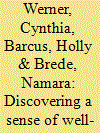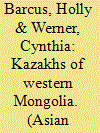|
|
|
Sort Order |
|
|
|
Items / Page
|
|
|
|
|
|
|
| Srl | Item |
| 1 |
ID:
126043


|
|
|
|
|
| Publication |
2013.
|
| Summary/Abstract |
Throughout Central Asia, the end of communism has been marked by a significant change in the management and influence of local mosques. In many rural areas, small underground mosques operated by informally trained, elderly moldas have been supplanted by newly constructed mosques led by younger, foreign-educated local imams and financed by governmental and private donations from Turkey, Saudi Arabia, and other countries. From several perspectives, this 'revival' of Islam is characterized in a way that implies that increased religiosity and piety is somewhat problematic. In this essay, based on six months of ethnographic fieldwork in Western Mongolia, we argue that such an approach prevents an understanding of how religious changes are enhancing the social and material well-being of certain actors. We explore the utility of the concept of well-being by focusing on the everyday lives of Kazakh imams in Western Mongolia. Approximately 100,000 ethnic Kazakhs live in the Western Mongolian province of Bayan-Ölgii, where they comprise about 80% of the population. Although a significant portion of the population has been migrating to Kazakhstan in the post-socialist period, the Kazakhs who choose to remain in Mongolia have experienced a significant increase in religious freedom. In this context, the new cohort of imams is playing an important mediating role as members of the local population reinterpret and renegotiate their identity as Muslims. In addition to finding spiritual well-being through their knowledge of Islam, these imams are acquiring social status and economic security from their local roles as religious leaders and through their transnational connections with a broader Muslim community.
|
|
|
|
|
|
|
|
|
|
|
|
|
|
|
|
| 2 |
ID:
097811


|
|
|
|
|
| Publication |
2010.
|
| Summary/Abstract |
The Kazakhs are the largest minority group in Mongolia, a relatively homogenous country dominated by Khalkh Mongols. Since 1991, Mongolia has transitioned politically and economically and witnessed significant changes in internal and international migration flows. The large-scale movement of ethnic Kazakhs from Western Mongolia to Kazakhstan represents one such emerging international flow. This migration is influenced by economic motivations, historical cultural ties to Kazakhstan, and immigration policies of both countries. This paper assesses the local and national circumstances that shape migration decision-making in Western Mongolia during the transition years and highlights changes in the characteristics and directions of migration flows during this time. We identify three periods of migration with each period characterized by changing economies and national policies in Mongolia and Kazakhstan, as well as changes in communications technologies and extensiveness of social networks among prospective migrants. These periods illustrate how transnational migration flows evolve through time and are affected by national, local, and individual circumstances.
|
|
|
|
|
|
|
|
|
|
|
|
|
|
|
|
| 3 |
ID:
157691


|
|
|
|
|
| Summary/Abstract |
This article explores issues of citizenship and belonging associated with post-Soviet Kazakhstan’s repatriation programme. Beginning in 1991, Kazakhstan financed the resettlement of over 944,000 diasporic Kazakhs from nearly a dozen countries, including Mongolia, and encouraged repatriates to become naturalised citizens. Using the concept of ‘privileged exclusion’, this article argues that repatriated Kazakhs from Mongolia belong due to their knowledge of Kazakh language and traditions yet, at the same time, do not belong due to their lack of linguistic fluency in Russian, the absence of a shared Soviet experience, and limited comfort with the ‘cosmopolitan’ lifestyle that characterises the new elite in this post-Soviet context.
|
|
|
|
|
|
|
|
|
|
|
|
|
|
|
|
|
|
|
|
|